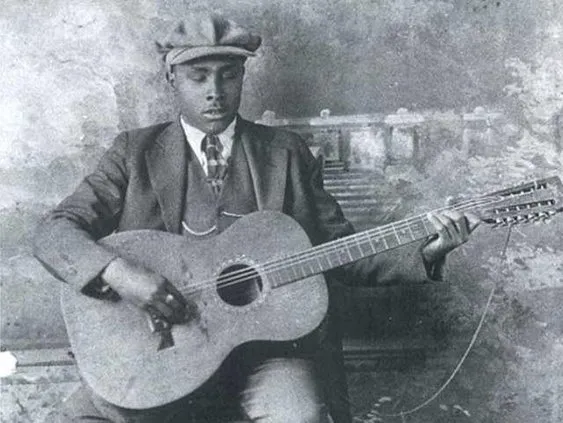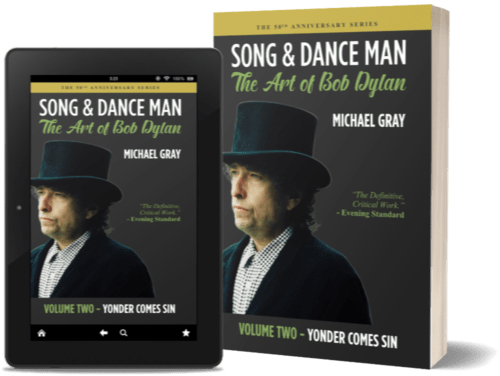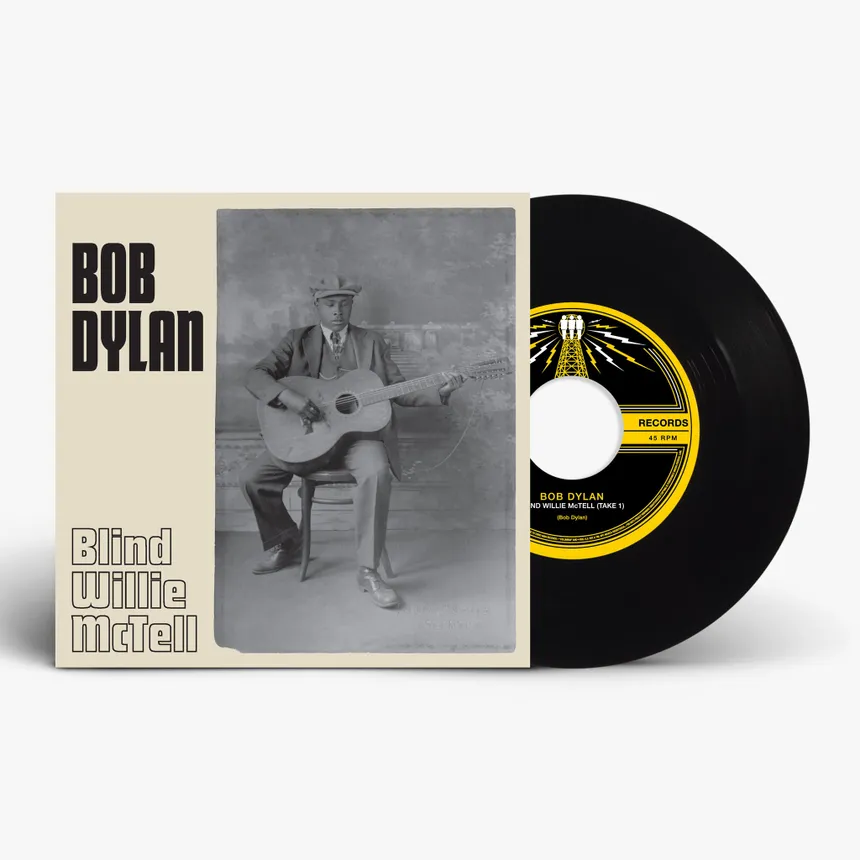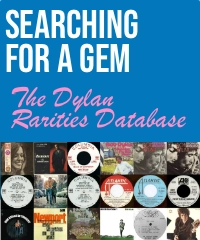<< Back to Blog
Blind Willie McTell (A Song & Dance Man Excerpt)
To accompany the our latest podcast, Dylan.FM S03 E09 Blind Willie McTell, here is an extended excerpt from Chapter 6: Blind Willie McTell.

Chapter Six: Blind Willie McTell
Blind Willie McTell is no roaring primitive, and no Robert Johnsonesque devil-dealing womaniser. He didn’t lose his sight in a jook-joint brawl, or hopping a freight train. He didn’t escape into music from behind a mule-plow in the Delta. He didn’t die violently or young. Instead, blind from birth but never behaving as if this were a handicap, this intelligent, articulate man became an adept professional singer and 12-string guitar-player who travelled widely and talked his way into an array of recording-sessions.
He never achieved a hit record, but he became, as a live performer and a man, one of the most widely known and well-loved figures in and around Georgia. Working clubs and car-parks, playing to blacks and whites, tobacco workers and college kids, Blind Willie McTell — human juke-box and local hero — enjoyed a modest career and an independent life.
Since his death the re-emergence of his many recordings has shown that McTell was also one of the blues world’s consummate artists. A well-kept secret among blues and folk fans in Britain and America since the 1950s, Blind Willie McTell is the last unrecognised superstar of the blues.
Blind Willie McTell, like Bob Dylan, is a complex, intelligent, articulate personality and artist, and behind Dylan’s great song reverberates a thorough knowledge of McTell’s exquisite work and, I think, Dylan’s sense of a deep companionship of spirit between them. McTell’s life is the stuff of exactly the sort of troubadour romance Bob Dylan fantasised for himself in his early years and has carried in his heart ever since. McTell is the blues singer Dylan would have been if he’d been “born in time”.
Listen To The Podcast
You can also listen to the podcast on all major podcast platforms. Links here. Our Premium Members and FM+ Subscribers get the Extended Episode or Video.
The first extant text of ‘The Unfortunate Rake’ wasn’t published until 1909, though it dates from 1848, when it was written down in County Cork from the performance of someone who’d learnt it in Dublin in 1790. That’s one account, anyway; another says that “The earliest text seems to be the eighteenth-century ‘Buck’s Elegy’, set in Covent Garden…” Either way, it was by oral transmission that this 200-plus-year-old song travelled around Britain and Ireland and to America, where it split into white versions and black.
The writer Karl Dallas uses its hydra-headedness to argue that the important things in folksong are often the incidentals:
To ensure that we are understood, we surround the central message of what we are saying with all sorts of peripheral stuff… known to communications theorists as redundancy. These may be metaphors, expansions, all the colourful turns of phrase which make all the difference between true human speech and the bald deadpan statement of a telegram — which… is the easiest kind of message to misunderstand because it has zero redundancy…
— Karl Dallas
The story of ‘The Unfortunate Rake’ is interesting because… while the central message may change, so that the soldier dying of syphilis in eighteenth-century London crosses oceans, changes sex, becomes a cowboy dying of gunshot wounds on the streets of Laredo, coming to rest finally in New Orleans as the black hero of ‘Gambler’s Blues’, more commonly known as ‘St. James’ Infirmary’, one detail remains constant, a redundancy essential to convey the point of the changing story: the ceremonial funeral.
The question of how many elements of the ‘Rake’ cycle Dylan imports into (it’s tempting to say “retains in”) ‘Blind Willie McTell’ is only one of its aspects, but it’s a starting point: it stresses their shared central purpose. Bob Dylan’s rich and complex song, with a melody that winds across the path of the ‘St. James Infirmary’ tune, is also about the problem of how to face death, extended onto the grandest of scales. While implicitly it mourns the death of McTell, it struggles with the problem of how to face, to witness, to confront, the world’s death rather than an individual one.
Let me say at once that Blind Willie McTell’s opening verse parallels the beginning of the ‘Rake’ songs. Where they see a doomed comrade wrapped in white linen and cold as the clay, Dylan sees the same thing on the grand scale: he has

(Author: Michael Gray)
… seen the arrow on the doorpost
Sayin’ this land is condemned
All the way from New Orleans to Jerusalem.
In the next lines, he pluralises coming upon “one of my comrades”, remembering that “many martyrs fell”, and expressing a sympathy with other unwilling recruits whose presence is felt in this pageant of suffering and struggle: the tribes conscripted from Africa as slaves, the chain-gangs forced to build the highways, the rebels forced to fight. And between “All the way from New Orleans to Jerusalem” and “I travelled through East Texas” he sets up echoes of ‘The Streets Of Laredo’, in which the narrator “born in South East Texas” says “I’ve trailed from Canadee down to old Mexico”. Instead of a crowd round the bedside and people “to sing a song”,
I heard that hoot-owl singin’
As they were takin’ down the tents
The stars above the barren trees was his only audience.
In parallel with “the women from Atlanta”, “them flash-girls”, or “pretty maidens”,
Them charcoal gypsy maidens
Can strut their feathers well…
The flowers are here too. The ‘Rake’ songs have “green laurel”, “white roses”, “red roses”, “wild roses”, “green roses” and “those sweet-smellin’ roses”; they also have, in ‘The Streets Of Laredo’, a southern setting in which “the jimson weed and the lilac does bloom”. In ‘Blind Willie McTell’ we see a southern setting in which we “smell that sweet magnolia bloom”.
Dylan’s
With some fine young handsome man
matches ‘St. James Hospital’s “with them handsome young ladies” and ‘The Unfortunate Rake’’s “some handsome young woman”, and he unites the “Hamilton Hotel” of McTell’s narrative with the conventional “St. James Infirmary” in his own, perfectly placed “St. James Hotel”. Dylan also uses “the window”, from the James Baker/Doc Watson variant. This begins with the window:
It was early one morning I passed St. James’ Hospital
…I looked in the window…
and Dylan ends with it. I can’t quite be certain, on either of the versions of ‘Blind Willie McTell’ that have circulated, that Dylan sings
I am gazin’ out the window…,
which reverses the old Texan version and places Dylan as the dying inmate, quietly appropriate to the theme that we are all facing imminent death; it’s always enticingly close to
I am gazin’ at the window…,
which would leave it nicely ambivalent as to which side of the glass Dylan is on as he bows his head and cries, while staring at the bleakness of the futureless future.
Dylan can also use the same language as the ‘Rake’ cycle but undermine its meaning. That “fine young handsome man”,
He’s dressed up like a squire…
which throws a shadow across his fine and handsome aspect: “dressed up like” suggests both the counterfeit, weighted down by that “bootleg whiskey in his hand”, and the vain, fluffed up by the resonance of the earlier, matching “strut”. Even the “sweet magnolia” sounds quite unlike the “sweet-smellin’ roses” of the earlier songs. I don’t know why, since Dylan adds nothing more beyond the phrase itself, yet we smell it as overripe and sickly. Where once the flowers were there to cover the smell of corruption, in Dylan’s song they give off the smell of corruption themselves.
Falsity, vanity and corruption compound cruelty and pain. Everywhere people are fallen, in chains, under the whip in this maelstrom of history. I say “maelstrom” because though it’s been said that ‘Blind Willie McTell’ rolls backwards through America’s past, in truth it offers no such consistent reverse chronology, and its vision is not limited to American terrain, though it returns to it time and again, not least by the device of Blind Willie McTell’s omnipresence.
This may disappoint the need for neatness but it is a strength of the song that most of its images evoke more than one era: more than one time and place, while pressing upon us, time and again, a running analogy between Old Testament and New World.

It begins at the beginning. The “arrow on the doorpost / Sayin’ this land is condemned” flickers with a picture of the marking out of Jewish houses in the pogroms of the 1930s, and with the daubing of the doors of plague victims in medieval Europe, but it harks back, as both these later scenes must, to the first occasion to yield such an image: the time of the Passover, when the first-born in Egypt were slain in the night by God, after the people of Moses were instructed to mark a sign on their doorposts in lamb’s blood so that death might pass over and spare their children: “…take of the blood, and strike it on the two side posts and on the upper door post of the houses”, as God instructs Moses in Exodus 12:7.
What’s so striking in Bob Dylan’s lyric, what gives us the sense that poetry is at work, is that Dylan can use this as the opening of a song that holds out no hope that anyone shall be spared the destruction coming in our night. There may be a sign on the doorpost but whose first-born — whose future — is to be spared this time, now that the land has been
…condemned
All the way from New Orleans to Jerusalem?
We reach America explicitly enough, of course, when we get to “East Texas, where many martyrs fell”. Across the border from New Orleans’s Louisiana, it sticks in the memory as a stronghold of the Ku Klux Klan: a place where black victims were untold martyrs, and where the same racist attitudes linger still. Yet “martyrs” has other, primarily religious, connotations. The word is thrown in like a spanner, to wobble us off our course of easy assumption about the focus of the song. The word “fell” has a distracting quality here too, somehow calling attention to itself by its declamatory vagueness.
Out of death, life arises. Out of bodily pain, the triumph of the spirit (pain sure brings out the best in people, doesn’t it?). Out of singing the blues, compensation: even joy. Dylan celebrates, in this song — as Blind Willie McTell does in ‘The Dyin’ Crapshooter’s Blues’. The work of art, as ever with Bob Dylan, is the recording, not the words on the page: but the words on the page demand from Dylan, and receive, two of his most focused performances: paying tribute to McTell’s artistry, he rises to the occasion with the excellence of his own. What a song!, you say when you read the lyric. What a record!, you say when you hear the belatedly-issued performance.
Song & Dance Man – Vol.2
Order your own copy of Song & Dance Man: The Art of Bob Dylan in paperback or on Kindle, at Amazon.
The FM Podcast Network Shows
- Dylan.FM
- The Dylantantes
- Infinity Goes Up On Trial
- Watching The Covers Flow
- Pod Dylan
- The Bob Dylan Primer


